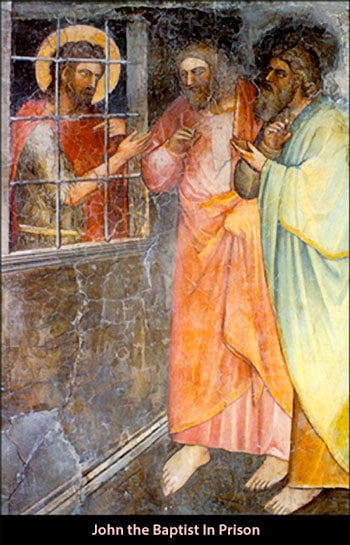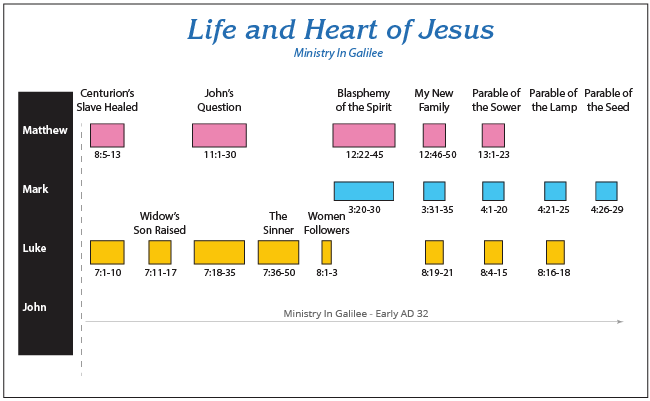During our last study we discovered that John the Baptist had heard about the great miracles that Jesus was performing while John was in prison. John was having doubts about Jesus, and the miracles only confused him more. So he sent two of his disciples to ask Jesus, “Are You the Expected One, or shall we look for someone else?” In response, Jesus performed more miracles and then told John’s two disciples to return and report to John what they had witnessed. Matthew 11:7 tells us that there were crowds standing around Jesus while all of this was occurring. What was the crowd thinking? Since John the Baptist had been telling the people that Jesus was the Messiah, some of them must have wondered too! When the herald starts having doubts, others may doubt too! Were some of Jesus’ loyal followers critical of John the Baptist for having doubts about Jesus? In this study (Matthew 11:7-11; Luke 7:24-28) Jesus honors John and reveals his true identity.

Used courtesy of easyweb.easynet.co.uk
Going Away
As John’s two disciples were going away, Jesus started speaking to the crowd,
As these men were going away, Jesus began to speak to the crowds about John, “What did you go out into the wilderness to see? A reed shaken by the wind? Matthew 11:7 (NASB)
Luke 7:24 appears to give us a different account of this event when it says,
When the messengers of John had left, He began to speak to the crowds about John, “What did you go out into the wilderness to see? A reed shaken by the wind?” Luke 7:24 (NASB)
Our English translations leave the impression that Matthew and Luke disagree about when Jesus started speaking to the crowds about John. Luke says that John’s two disciples had left before Jesus started speaking. Matthew appears to say that the men were in the process of going away. The answer is found in the Greek verb that is translated in Matthew as “going away.” The Greek word is poreuomai. It is a present participle verb which implies the men had been in the process of leaving Jesus. The men had begun walking away and were still in the process of walking away. It is a different Greek word than the one used in Luke. Luke reveals that the two men had essentially left before Jesus turned to the crowds. Matthew gives us a more vivid account.
After John’s disciples were some distance away, Jesus asked the crowds, “What did you go out into the wilderness to see? A reed shaken by the wind?” The Greek word that Jesus used for “to see” is theaomai. The word refers “to observing closely something that is very unusual.” Jesus knew that the crowds had come not just to see John the Baptist. They had gone out into the wilderness because they believed John was extraordinarily unusual. That is why Jesus selected the word He did. They did not go out to see reeds blowing in the wind. Jesus was being sarcastic.
But what did you go out to see? A man dressed in soft clothing? Those who wear soft clothing are in kings’ palaces! Matthew 11:8 (NASB)
Nor did they go out expecting to see a man dressed in soft clothing.
But what did you go out to see? A prophet? Yes, I tell you, and one who is more than a prophet. Matthew 11:9 (NASB)
They did not go out to see some ordinary person. They had gone out to see someone whom they believed was a great prophet! They did not go out into the desert to see a king, reed, snake, or some person just walking in the desert. They thought they were going out to see one of God’s greatest prophets.
The Promised Prophet
They did not know that John the Baptist was the one that Malachi 3:1 predicted. So Jesus announced,
This is the one about whom it is written, “BEHOLD, I SEND MY MESSENGER AHEAD OF YOU, WHO WILL PREPARE YOUR WAY BEFORE YOU.” Matthew 11:10 (NASB)
This is the same passage that John the Baptist’s father had used to predict John’s future ministry (Luke 1:76). John was the prophet that God had promised would come before the Messiah. Jesus did not quote all of the Malachi 3:1 prophecy, but anyone familiar with it should have known that it referred to Jesus.
. . . And the Lord, whom you seek, will suddenly come to His temple; and the messenger of the covenant, in whom you delight, behold, He is coming,” says the LORD of hosts. Malachi 3:1 (NASB)
We are told that Jesus even went to the temple at the age of twelve (Luke 2:40-51) and was asking and listening to the religious teachers. As an adult He went into the temple and removed the money changers (John 2:15). Throughout His ministry He taught in the temple (Mark 14:49; Luke 4:16; 19:47; John 7:28; 8:2).
Jesus established a new covenant (Hebrews 8:7-13; 9:14-15). During the last supper and just before His death, Jesus told the disciples,
This cup which is poured out for you is the new covenant in My blood. Luke 22:20 (NASB)
Both John and Jesus were the fulfillment of Malachi 3:1.
John was the forerunner or the prophet who would come before the Messiah and announce His arrival. Jesus was the one for whom the people were waiting. Yes, John was more than an Old Testament prophet; he was the forerunner of the Messiah. He was the voice of one crying in the wilderness (Isaiah 40:3; Matthew 3:3).

Used Courtesy of www.catholic-resources.org
The Least Is Greater?
Jesus’ next statement can be difficult to understand.
Truly I say to you, among those born of women there has not arisen anyone greater than John the Baptist! Yet the one who is least in the kingdom of heaven is greater than he. Matthew 11:11 (NASB)
Jesus’ point is that no one greater than John had been born through natural, human, sexual relations. He was the greatest of all the prophets because he was the forerunner of the Messiah. But what did Jesus mean that “one who is least in the kingdom of heaven is greater than he”?
There are many views as to what this statement means. Therefore, we will examine a few of the major ones.
Younger View. One of the views claims that the Greek word that is translated as “least” actually means “younger.” Then Jesus’ statement would imply that the younger one, Himself, was the one that is greater than John. But, the root Greek word is mikros. We get our word “micron” from it. An examination of any good Greek lexicon will reveal that the word refers to something that is “smaller” and not younger. Therefore, this view is rejected.
Jesus Is Less. Another view says that Jesus was not yet king at the time that He made this statement. Therefore, Jesus was less than John. This view ignores Matthew 3:11 where John the Baptist implies that Jesus is greater.
As for me, I baptize you with water for repentance, but He who is coming after me is mightier than I, and I am not fit to remove His sandals; He will baptize you with the Holy Spirit and fire. Matthew 3:11 (NASB)
It is also important to notice that in the process of answering one of Pontius Pilate’s questions, Jesus stated that He already had a kingdom and He was a king (John 18:36-37). Jesus did not need to wait to become a king some day. Therefore, this view is rejected.
Unambiguous View. A third view says that the prophets of old knew that the Messiah would be coming, but they did not know when He would come exactly or who He was. The view also claims that John knew when the Messiah was coming even though he was not completely sure who the Messiah was, but those who are in heaven knew exactly when the Messiah would come and that He was Jesus. Therefore, even the least in the kingdom was greater since they had better knowledge. Their view is rejected for two reasons. First, the passage does not even give us a hint that the issue is about identifying the Messiah. Second, 1 Peter 1:10-12 states that even the angels did not know everything about the Messiah. If that is true, why would the least in the kingdom of heaven know more? Therefore, this view is rejected.
New/Old Covenant View. The next view says that John the Baptist was the greatest of the saints in the Old Covenant (that is, before Jesus’ death). Yet, even the least in the New Covenant (that is, after Jesus’ death and return to life) would be greater than John since they would be in the New Covenant. Since this view cannot be supported by scripture, it is rejected.
Participation View. The fifth view says that those who were able to participate and experience Jesus’ ministry were greater than those who were not able to participate and enjoy it. Therefore since John was in prison, even the least of those who participated in Jesus’ ministry were greater than John. Since this view cannot be supported by scripture, it is rejected.
Is” View. The most obvious and correct view can be discovered by asking, “What is the plain meaning of Jesus’ words?” What did Jesus say? The key word in Jesus’ statement is the word “is.” It is repeated twice.
. . . Yet the one who is least in the kingdom of heaven is greater than he. Matthew 11:11 (NASB)
Jesus was not talking about the past or the future. He was talking about the present. The followers of God who believed in Him and died down through the ages were those who were living in the kingdom of heaven. They were holy spiritual beings living in heaven while Jesus walked, taught, and performed miracles on the earth. Those who were alive on planet earth were not holy beings, except for Jesus (2 Corinthians 5:21; Heb. 4:15). They were sinners (Romans 3:23; 6:23) living in a fallen, sinful world. Just read the daily newspapers, watch the news, and see how people act on the streets and how members of a family interact. Every person on this planet lives in a sinful world (Romans 5:12). Jesus’ point is that holy, spiritual beings in their glorified, heavenly bodies are greater than people who are still living on earth. Therefore, even the great John the Baptist was less than the least person in heaven. He was still on the earth and not up in heaven. Jesus was making a spiritual statement. God sees us through a spiritual camera lens and not as man sees. He is interested in our spiritual condition. This view understands Jesus’ words plainly. Yes, John was great in this life, but when compared to those spiritual beings in heaven, he was less.
When Jesus made this statement, He indirectly sent another message to the crowds. He sent the message that the kingdom of heaven or the kingdom of God was a real place. We have read and we will discover again later in our study that the Jews were waiting for a kingdom. Therefore, if you or I had been listening to Jesus and had been expecting and waiting for the kingdom, how would you react when Jesus said that it already existed? It was not a place that philosophers talk about, a place of fantasy and make-believe, or a place of dreams. It was real. When Jesus used the word “is” He implied that the kingdom of heaven existed then. At least one person must have realized that Jesus was saying the kingdom of heaven exists now, and it was better to be there than where they were living. If you had been waiting for the kingdom of heaven, how would you have felt?
Until John
Why did Jesus tell the crowd that John was the prophet who would come before the Messiah, and that no one but those in heaven were greater than John the Baptist? Why was Jesus talking about John? Unfortunately, we are not told, but it appears that Jesus is answering the question, “Why did John question you?” If you are the Messiah, or the Coming One, why is John the Baptist in prison? Some in the crowd might have been criticizing John in their thoughts, since faithful followers tend to support their leaders.

So far Jesus has declared that John the Baptist was the forerunner of the Messiah who was predicted in Malachi 3:1. That must have stunned the crowd. Some had probably wondered if that was true; but when Jesus declared it to be fact, they must have been filled with excitement because every Jew was waiting for the Messiah to come. Then many in the crowd would have agreed that John was greater.
Jesus’ next statement must have been stunning too!
From the days of John the Baptist until now the kingdom of heaven suffers violence, and violent men take it by force. For all the prophets and the Law prophesied until John. Matthew 11:12-13 (NASB)
Luke 16:16 records another time when Jesus made essentially the same statement. At that time Jesus re-ordered the two comments and added an additional comment,
The Law and the Prophets were proclaimed until John; since that time the gospel of the kingdom of God has been preached, and everyone is forcing his way into it. Luke 16:16 (NASB)
By saying that all the prophets had prophesied until the time of John, Jesus declared that the divine plan of the ages was coming together. God’s great plan for Israel was near completion.
The Apostle Peter tells us that the prophets had prophesied about Jesus, and the angels of heaven had desired to know when Jesus would appear and what would occur.
As to this salvation, the prophets who prophesied of the grace that would come to you made careful searches and inquiries, seeking to know what person or time the Spirit of Christ within them was indicating as He predicted the sufferings of Christ and the glories to follow. It was revealed to them that they were not serving themselves, but you, in these things which now have been announced to you through those who preached the gospel to you by the Holy Spirit sent from heaven—things into which angels long to look. 1 Peter 1:10-12 (NASB)
The time had arrived. The forerunner was now here. The long wait for the prophets and angels was over. The crowds were standing on the threshold of sacred history. John the Baptist and Jesus had been announcing that the Kingdom of Heaven was near, and it was. All the Law and the Prophets had pointed to the time of John, and he was the forerunner of the Messiah – the One who was to come!
Conclusion
We will explore Jesus’ statement about the kingdom suffering violence and violent men taking it by force in our next study. We will close with the following statement about Jesus,
Therefore when the people saw the sign which He had performed, they said, “This is truly the Prophet who is to come into the world.” John 6:14 (NASB)
The forerunner had accomplished his mission – his purpose. Many, not all, understood that Jesus was the Promised One – the Messiah. Some, including the Jewish leaders, did not want the kingdom that Jesus offered. They wanted their own kingdom. They wanted control. They wanted their own religion. As a result, in our next study we will see that they rejected John and Jesus. They rejected everything that had been promised.
The same is true today for many. God has offered to forgive our sins and allow us to live with Him forever. But some do not want what God offers. They want God and His kingdom to conform to their wishes. As a result they reject what He is offering. Someone once told me that the type of God he was looking for was one who would accept him as he was. Unfortunately, we do not have a choice of gods to choose from. What are your expectations of God? God calls us sinners and says that we going to an eternal punishment. So He offers forgiveness of your sins if you will believe Him and are willing to submit to Him. He has offered us help because He holy, just, compassionate and loving!
Suggested Links:
Forerunner John The Baptist Has ArrivedJohn the Baptist
John the Baptist’s Testimony
John the Baptist’s Last Testimony
John the Baptist Has Doubts About Christ